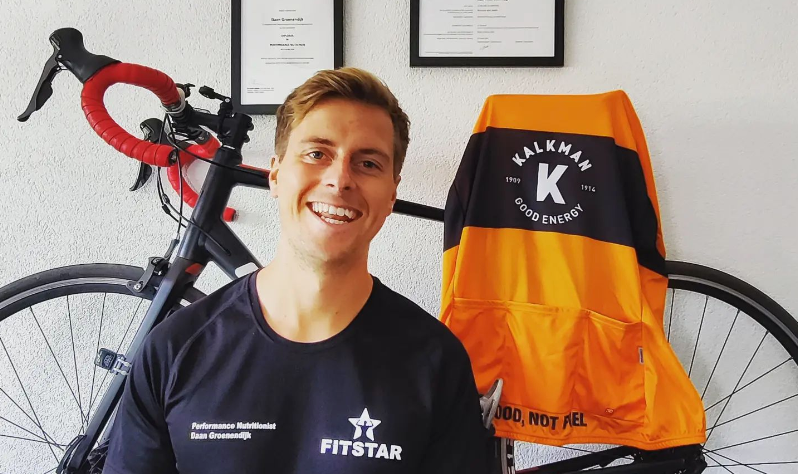
Q and A with Daan, nutritionist for athletes
Daan is a nutritionist for athletes. On Instagram he answers short questions from our ambassadors. These questions are also relevant for other athletes so we are sharing a few in this blog. If you have a question for Daan, feel free to ask it on our Instagram .
Kaspar:
I am a vegetarian, I can manage this well in daily life. My only question is: what do I have to take into account as a vegetarian when I'm on my bike?
Dan:
As a vegetarian cyclist you want to take protein and protein quality into account. It is true that vegetarian protein is often slightly lower in quality and also slightly less digestible. That means that you as a vegetarian and especially if you are vegan, need to eat a little more protein than other people to meet your protein needs. In addition, research shows that vegetarians and vegans often consume less vitamin B12, iron, zinc and omega-3 fats. To compensate for this, it is wise to consider supplements and eating plenty of nutrient dense real foods such as nuts, legumes, beans and green leafy vegetables. Many vegetarians and vegans have an awful lot of fiber in their diets. This can lead to abdominal discomfort, especially if you are cycling and especially if you need a high energy intake. Then it is sensible to eat a little less fiber around your rides so that you can absorb more carbohydrates without getting stomach discomfort.
Jean-Jacques
My question to you is how can I best manage my slow digestion during endurance events?
Dan:
Good question. Indeed, because you have a slow digestion, it is good to take a number of things into account. One, eat well in advance. That may be a bit slower for you and that's why it's important that you take your last big meal at least two or maybe three hours before you start your training or competition. Two, ensure a personal approach when cycling. Because the blood circulation changes during exercise, more blood goes to the muscles and there is less blood circulation in the intestines. It makes it difficult for the intestines to absorb food during exercise. That is why it is extra important for you, with your slow digestion, to see what and how much you can properly absorb while cycling. It may also be an idea for you to take smaller portions of foods you already know. Third, train your gut so that the intestines also become better and more efficient at handling carbohydrates and nutrition during exercise. So make sure you eat well beforehand, that you have a personalized nutrition plan and that you train the gut to become more tolerant of the sports nutrition you take before and during cycling.
Luc
I am very curious how much caffeine I should take if I exercise for an hour, for example.
Dan:
Caffeine can have a performance-enhancing effect, which is absolutely true for most people. But caffeine is personal, it works differently for everyone, the effects can be different. Some people are very sensitive, easily get stomach complaints. So it's especially important to see what works well for you. But in practice, a good guideline is to use around to 3mg of caffeine per kg of body weight. That means if you weigh 70kg you can take about 200mg of caffeine or two cups of coffee or a double espresso. That should provide enough to improve your sports performance during the following hour.
Susan
I wondered what I should eat so that I have energy while cycling but also be prepared for recovery.
Dan:
For sufficient energy on the bike, it is important that you consume enough carbohydrates while cycling. The guidelines are 30g per hour for one to two hours on the bike, 60g per hour for two to three hours and 90g per hour for longer rides. But those guidelines are made for the fanatical athlete who will exercise at a high intensity. Perhaps it is important for you that you set these guidelines slightly lower, especially if you are dealing with abdominal complaints. Then it's just too much. What's great: you can spread the carbohydrate intake nicely over the hour and you can also choose the products that work well for you. Then you naturally want to recover well and then it is important that you match your energy intake to your energy consumption. This is quite difficult with long-term and intensive sports. You can burn 4,000 kilocalories or more on such a day and you also want to eat accordingly. So if you can take in enough energy on the bike to contribute to that, it certainly helps with recovery. Proteins are also important. Make sure you eat enough protein after an intensive or prolonged workout; 30g after training and 30g before sleeping. So in short: make sure you eat well before, during and after training or competitions. Also pay attention to your protein intake and that you match your energy intake with your energy consumption.
Kaspar:
I am a vegetarian, I can manage this well in daily life. My only question is: what do I have to take into account as a vegetarian when I'm on my bike?
Dan:
As a vegetarian cyclist you want to take protein and protein quality into account. It is true that vegetarian protein is often slightly lower in quality and also slightly less digestible. That means that you as a vegetarian and especially if you are vegan, need to eat a little more protein than other people to meet your protein needs. In addition, research shows that vegetarians and vegans often consume less vitamin B12, iron, zinc and omega-3 fats. To compensate for this, it is wise to consider supplements and eating plenty of nutrient dense real foods such as nuts, legumes, beans and green leafy vegetables. Many vegetarians and vegans have an awful lot of fiber in their diets. This can lead to abdominal discomfort, especially if you are cycling and especially if you need a high energy intake. Then it is sensible to eat a little less fiber around your rides so that you can absorb more carbohydrates without getting stomach discomfort.
Jean-Jacques
My question to you is how can I best manage my slow digestion during endurance events?
Dan:
Good question. Indeed, because you have a slow digestion, it is good to take a number of things into account. One, eat well in advance. That may be a bit slower for you and that's why it's important that you take your last big meal at least two or maybe three hours before you start your training or competition. Two, ensure a personal approach when cycling. Because the blood circulation changes during exercise, more blood goes to the muscles and there is less blood circulation in the intestines. It makes it difficult for the intestines to absorb food during exercise. That is why it is extra important for you, with your slow digestion, to see what and how much you can properly absorb while cycling. It may also be an idea for you to take smaller portions of foods you already know. Third, train your gut so that the intestines also become better and more efficient at handling carbohydrates and nutrition during exercise. So make sure you eat well beforehand, that you have a personalized nutrition plan and that you train the gut to become more tolerant of the sports nutrition you take before and during cycling.
Luc
I am very curious how much caffeine I should take if I exercise for an hour, for example.
Dan:
Caffeine can have a performance-enhancing effect, which is absolutely true for most people. But caffeine is personal, it works differently for everyone, the effects can be different. Some people are very sensitive, easily get stomach complaints. So it's especially important to see what works well for you. But in practice, a good guideline is to use around to 3mg of caffeine per kg of body weight. That means if you weigh 70kg you can take about 200mg of caffeine or two cups of coffee or a double espresso. That should provide enough to improve your sports performance during the following hour.
Susan
I wondered what I should eat so that I have energy while cycling but also be prepared for recovery.
Dan:
For sufficient energy on the bike, it is important that you consume enough carbohydrates while cycling. The guidelines are 30g per hour for one to two hours on the bike, 60g per hour for two to three hours and 90g per hour for longer rides. But those guidelines are made for the fanatical athlete who will exercise at a high intensity. Perhaps it is important for you that you set these guidelines slightly lower, especially if you are dealing with abdominal complaints. Then it's just too much. What's great: you can spread the carbohydrate intake nicely over the hour and you can also choose the products that work well for you. Then you naturally want to recover well and then it is important that you match your energy intake to your energy consumption. This is quite difficult with long-term and intensive sports. You can burn 4,000 kilocalories or more on such a day and you also want to eat accordingly. So if you can take in enough energy on the bike to contribute to that, it certainly helps with recovery. Proteins are also important. Make sure you eat enough protein after an intensive or prolonged workout; 30g after training and 30g before sleeping. So in short: make sure you eat well before, during and after training or competitions. Also pay attention to your protein intake and that you match your energy intake with your energy consumption.
